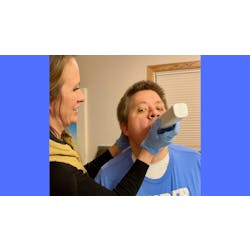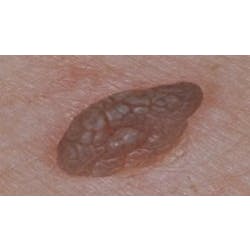BY ANNE NUGENT GUIGNON, RDH, MPH
Two decades ago, it was odd for dental hygienists to purchase their own equipment; now it is a relativity common practice. Three factors have fueled this change. Years ago, the student kit rarely contained anything other than hand instruments. In an effort to lower tuition and fees, many schools have adopted cost shifting. Today's students are often expected to purchase their own polishing handpieces, power driven scalers, magnification systems, and even disposable supplies such as masks, gloves, and gowns. Due to their training, many recent graduates are not put off by taking a bigger role in what they use in practice.
Another driving force is the increasing awareness of the relative risk for developing a workplace-related musculoskeletal disorder (WRMSD). Reported injury rates among dental hygiene practitioners range from over 50% to as high as 87%.
---------------------------------------------
Other articles by Guignon
- Dental germaphobics: When patients are not 'crazy'
- Dental Ergonomics: Growing a professional backbone
- Fluoride-free products that patients will love
---------------------------------------------
Many hygienists purchase equipment designed to reduce the physical stressors of clinical practice (e.g., custom-fitted magnification loupes, saddle stools, polishing handpieces, auxiliary headlights, power scalers). Others are fed up with the quality of the products provided by their employers or the worn-out equipment they are expected to use day after day. These hygienists are literally taking matters into their own hands (pun intended) and purchasing everything they need to make their day work better. The list can also include sharpen-free hand instruments, high-resolution mirrors, suction system devices, and even better fitting gloves.
The third situation fueling change is that of hygienists who either work in alternative settings or live in states where they can provide care to patients in an independent setting. The challenges of working outside of the four walls of a traditional dental practice are complex. Companies such as DNTLworks have a full range of portable and mobile dental units to meet a wide variety of clinical applications. There are portable units for the on-the-go clinician who does sealants in schools to complex systems that include suction, lighting, as well as high- and low-speed handpiece options.
The Internet has made it really easy to research product options. Various online dental hygiene groups are a great way to learn about products as well, but it is important to take this information with a big grain of salt. For example, saddle stools are becoming increasingly popular, but just ordering a saddle online without being properly fitted can be a dangerous plan. If the style does not fit your torso or the saddle is not properly adjusted, there is a potential to add to your WRMSD risks.
Asking colleagues to comment on equipment and products is a legitimate way to get information, but just because XYZ product fits Suzy does not mean the product will work for your body. It only means that Suzy is happy using it. The same goes for online testimonials on a company's website. How do you know the testimonials are really written by hygienists? And even if they are, it does not mean the product will work for you.
The other day, a hygienist contacted me about getting a new pair of magnification loupes, knowing I had been involved in the design of the RDH Elite loupes. Even though she had never tried the frame on, she assumed it was the right product for her. I encouraged her to make an appointment for a personal fitting. While the RDH Elite may be her best option, she needs to look at a variety of frames to find which fits her face and head the best. She is also planning on purchasing a saddle and a headlight. I advised her to have measurements taken with all three systems in place to get the ideal synergy from the three products.
So what should you take away from the online chats? People want to share ideas, and chat rooms are full of people with good intentions. But remember that most of the comments are based on a singular experience. Product endorsements based on one person's experience, however glowing or dismal, should not be taken as gospel. Look for comments or threads about product reliability and durability. Pay attention to the buzz about customer service. Find out if a company can take custom measurements or if their customer service folks can help with the final product tweaks.
On the surface it might make sense to ask a colleague what their loupes cost or how much they paid for a particular product. But if you're talking about a custom product such as a pair of loupes or a portable dental unit, the cost is based on the exact features built into each device as well as the individual components. For example, the only wireless loupe/headlight system on the market is made with a very unique frame built to accommodate the batteries. It is a far different product cost and experience to ordering a pair of loupes and adding a light at a later date. The two systems will have different price points and different features.
Last week I met with a hygienist who practices right across the hall from my optometrist. She was interested in getting a saddle stool, so I took one over for her to try. It was easy to adjust the saddle to her torso. Then the conversation switched to her magnification system. Her loupes were four years old but had never been adjusted to fit her face and head properly. She was losing the most important benefit from wearing loupes - a safe, neutral head posture. Her neck was bent forward! I snapped a few photos with my smartphone to show her the problem. Fortunately, her loupes were made with an adjustable frame. With permission, I made some subtle temple and nose pad adjustments, and voilà, increased her declination angle just enough to allow her to look through the oculars while sitting up straight.
Once again, I applaud every one of you who has taken an active role in protecting your physical health from the rigors of dental hygiene practice. What a way to create your own comfort zone - acquire equipment that allows you to work in safety and comfort. RDH
ANNE NUGENT GUIGNON, RDH, MPH, provides popular programs, including topics on biofilms, power driven scaling, ergonomics, hypersensitivity, and remineralization. Recipient of the 2004 Mentor of the Year Award and the 2009 ADHA Irene Newman Award, Anne has practiced clinical dental hygiene in Houston since 1971.




